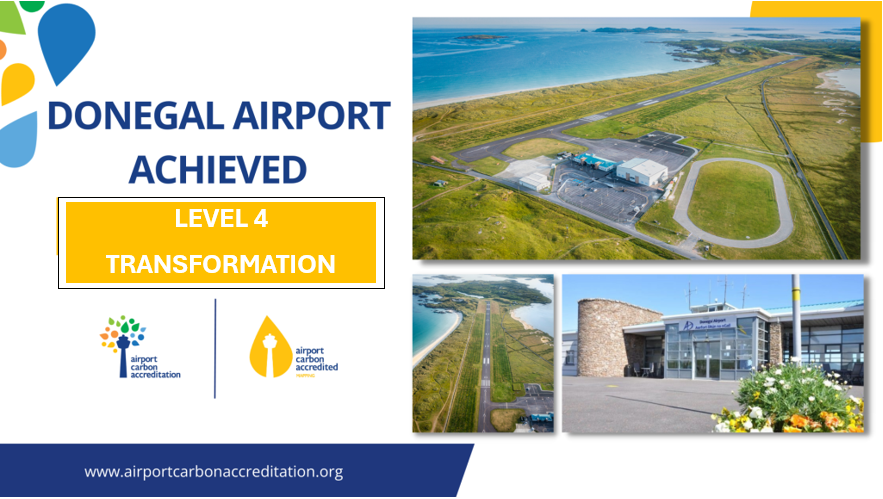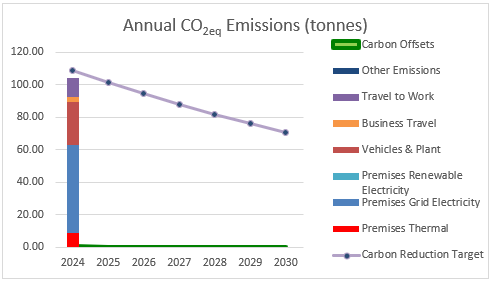ENVIRONMENTAL POLICY
Donegal Airport Emission Reduction Statement
Donegal Airport recognises the importance of taking action to reduce our greenhouse gas (GHG) emissions, to mitigate the increasing impacts of climate change, combined with action to ensure the airport continues to assess its wider impacts on sustainability. Measures to reduce GHG emissions at Donegal Airport have been ongoing since 2017, however the airport management recognises that more must be done over the coming years to support wider society in achieving net zero by 2050. This policy statement details the significant commitments our airport is making to reduce its GHG emissions, whilst reflecting the realities of the complex, multi-faceted challenges the aviation sector faces, for example, the level of technological readiness and supply chain challenges that exist in the alternative to fossil-based aviation fuels. We have worked tirelessly since 2017 to reduce our scope 1 and 2 GHG emissions and a measure of our success was the announcement in 2023 that we had achieved our goal of a 51% reduction by 2030 ahead of schedule, having achieved a 70.6% reduction on our baseline figures in 2023.
We understand the importance of being transparent in the way we report our emissions and remaining ambitious in our targets. Our role as a critical regional connection and our deep-rooted history will allow us to contribute to the wider decarbonisation of the aviation sector in Ireland, and we are committed to working with partners in our supply chain and in our communities to embed emission reductions across our organisation.
Having drafted our first net zero decarbonisation plan and quantified our scope 3 emissions during 2023, we developed a climate risk assessment to better understand the projected climate risks and the associated impacts on our operations as the century progresses. This allowed us to embed effective adaptation opportunities throughout the airport. In 2024 we further widened the quantification of our emissions, with the inclusion of scope 3 emissions to include all relevant Greenhouse Gas Protocol (GHGP) categories and we successfully obtained Airport Carbon Accreditation (ACA) Level 4 ‘Transformation’ certification, proudly being the first Irish airport to do so. This certification highlights our continued dedication to reducing emissions. Our impact extends beyond carbon, and in 2025 in additional to renewing our ACA certification at Level 4, we are committed to the continued development of the Sustainability Strategy drafted in 2024 to assess our wider environmental, social, human and financial impacts. We will work on strategies to mitigate the impacts identified and support the development of local and national plans in relation to environment and sustainability, such as the National Climate Adaptation Plan and National Climate Adaptation Strategy.
Our environmental and sustainability plans show our determination to become a more sustainable business, which can continue to grow in a net zero world. Therefore, we are committing to a new series of GHG emission reduction targets that reflect our achievements, whilst setting us on a course of ambition:
- Near term target of a 70% reduction in scope 1 and 2 emissions by 2030, from a 2017 baseline (exceeding a IPCC 1.5oc emission reduction pathway)
- Long term target of Net Zero emissions across all scopes no later than 2050 (aligned to an IPCC 1.5oc emission reduction pathway).
How we will deliver these commitments
We will deliver these commitments by enacting the decarbonisation measures identified in our net zero strategy, and through the continued development and implementation of our Stakeholder Partnership Plan, to work across the aviation industry, government and our suppliers. In addition, we will continue our participation in government-led working groups on the future of aviation fuel, noting that a significant proportion of an airport’s scope 3 emissions is attributed to fossil jet fuel.
Responsibilities
We will measure and review progress against our emissions targets at least every year and report performance through transparent communications within a robust governance system.

EcoMerit Certification
Donegal Airport operates twice daily scheduled flights to Dublin and 4 times a week scheduled flights to Glasgow, with worldwide onward connections. We were voted the world’s most scenic approach for the third year in 2020 and our airport is surrounded by protected Natura 2000 sites and a Blue Flag awarded beach. We are committed to protecting this unspoiled natural scenery and natural heritage.
As with all organisations, we recognise that our activities do involve negative environmental impacts. It is our aim to minimise these by;
Complying with environmental law
Measuring and monitoring our environmental performance
Actively seeking to continuously improve our performance
Minimising the risk of pollution from our operations
Encouraging our suppliers, customers & other stakeholders to do likewise
This is reflected in our commitment to ![]() Environmental Certification.
Environmental Certification.
Our most significant direct environmental impacts arise from the electricity and fuel we consume. To reduce our carbon footprint, we have upgraded our building and runway lighting to LED, installed a solar PV system, purchased electric ground support vehicles, replaced the terminal building roof, are using a heat pump for our hot water and AC for main terminal building heating requirements, and also implemented PBN (Performance Based Navigation) procedures. Level 4 Airport Carbon Accreditation has been achieved in 2024.
We routinely monitor our electricity, oil and mains water usage and operate a segregation system to ensure our waste is recycled wherever possible and landfill waste is minimised.
In all our activities, we aim to be an environmentally responsible member of the community we serve.
Airport Carbon Accreditation Certification
Donegal Airport has taken its first significant step towards comprehensive carbon management by achieving Level 4 – ‘Transformation’ of the programme.
This level is achieved through meticulous analysis of CO2 emissions at the airport site and establishing a plan to reduce them.
See our Airport Carbon Accreditation Certificate here.





